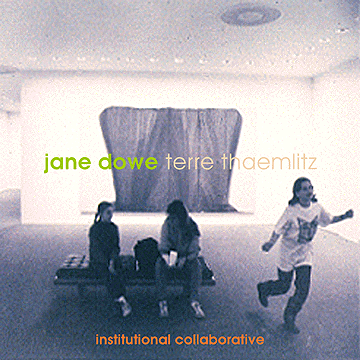|
comatonse recordings shop ショップ |

|
dowe & thaemlitz institutional collaborative 制度上の共同 (1998) |
Jane Dowe & Terre Thaemlitz: Institutional Collaborative | Full-length CD Album | Released 1998 | Germany: Mille Plateaux, MPCD53
- 01/DT/05:04
- 02/TDT/03:02
- 03/DTD/05:56
- 04/DTDTD/02:36
- 05/DT/06:21
- 06/TDT/03:13
- 07/DTDT/04:27
- 08/TD/04:17
- 09/DTD/05:52
- 10/TDT/03:36
- 11/DT/03:47
- 12/TDT/08:05
- 13/DTD/05:53
Special introduction by Molly Taylor of Escape Tank
Over several years of correspondence, the members of the Institutional Collaborative, Jane Dowe and Terre Thaemlitz, have only communicated via digital means - e-mail, DAT and CD. As a music journalist, Dowe had initially engaged Thaemlitz in discussion about some of his audio projects. Dowe's participation in major U.S. university Computer Music programs, as well as her various private and commercial audio endeavors, quickly led to a series of tape exchanges with Thaemlitz. As their dialogue grew, it became increasingly apparent that both Dowe and Thaemlitz share some peculiar similarities in their productive processes - both sonically and in terms of cultural relations. Aside from the obvious similarity of their avid use of direct digital synthesis techniques, both Dowe and Thaemlitz find themselves situated as both subjects and objects within the often contradictory economies of an Ambient marketplace, popular music media, and academia. As the moniker Institutional Collaborative suggests, it is through a recognition of such cultural associations that Dowe's and Thaemlitz' collaboration takes shape.For Dowe and Thaemlitz, Electroacoustic music production encompasses the irresolvable hypocrisy of a mutual adoration for creative presence, and for 'black-box' strategies which allow computer randomization to play an integral role in 'creative' decision making processes. It is from this vantage point that Dowe and Thaemlitz suggest a critical engagement of dominant musical discourses which paradoxically present the musician as both the ultimate individual (distinct from society), as well as a communal visionary (reflective of society).
When their discussion first turned to the notion of audio collaboration, pushed in awkward directions by the demands of conventional artistic collaboration, a suggestion that they should "meet" in a studio briefly emerged to their dissatisfaction. For Dowe and Thaemlitz, a requirement that they physically cohabitate the same "analogue" space during production would have meant a deprioritization and/or disavowal of those very social "digital" processes which led to their collaboration. This dichotomous opposition between the analogue and the digital has a profound effect upon contemporary music production: analogue sounds are typically characterized as 'warm,' while digital sounds are described as 'cold' and undesirable. For many producers who place an emphasis on notions of self-expression, this prioritization of the analogue reflects an attempt for Humanist individualism to overcome the alienations of a digitized global post-Industrial Capitalist marketplace. But as Thaemlitz points out, "By positioning the analogue and the digital in dichotomous opposition to one another, the analogue-Human is placed in opposition to those digital-cultural relations which repress notions of the Human. This implies that a realization of Human potential may only occur through a transcendence of social processes to a level of pure Humanity. The result of pursuing such a dichotomy, then, is quite the opposite of its implications of individualistic freedom. In the quest to recoup the analogue in order to overcome social alienations, one is actually seeking detachment from social processes, literally contributing to processes of cultural alienation."
As Dowe notes, regardless of attempts at criticality, "we are forced to start with our own internalization of the ideologies and circumstances we wish to critique - such as those revealed in our reflexive need to measure and qualify artistic product in an academic or intellectual sense. We cannot help being caught up in the objectives of the institutions through which we support ourselves. We can never presume objectivity in analysis, or a totalizing understanding of the processes we employ." For Dowe and Thaemlitz, recognizing that their own desires can develop and be redirected in hypocritical ways alludes to a greater social circumstance in which desires have come to obscure actual needs in production. It is here that they find a more puzzling degree of alienation which serves as the collaborative element between their various activities.
It is Dowe's and Thaemlitz' needs to contextualize musicians and listeners within a social framework that can be surmised as the post-Modern condition. It is their operation within a dominant field of cultural influence which opposes such contextualizations that leads to their own unresolved desires for a recoupment of the analogue within the digital domain. The result is audio which both privileges and disavows musicality through an intermixing of digital residue with carefully disclosed source materials. The often lounge-like characteristics of these source materials often invokes the ambiance of a late '80s Ambient marketplace, calling into question this and similar projects' relationships to a music industry which has declared a loss of interest in Ambient music because it is not readily reconcilable with traditional identity-driven marketing techniques. Through the Institutional Collaborative, Dowe and Thaemlitz have turned their questions about the viability of their own actions into an active response to a reluctant marketplace that associates their interests with the decline of an economic agenda which was never their own.
| - Molly Taylor (Escape Tank), February 1998 |